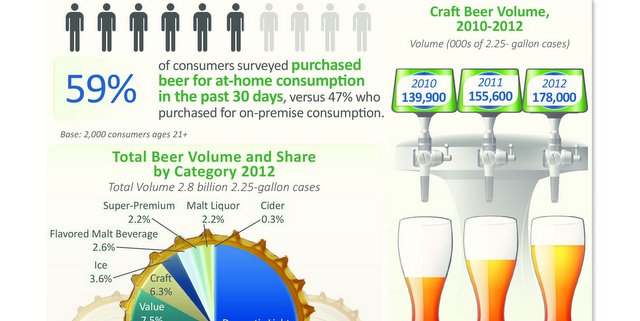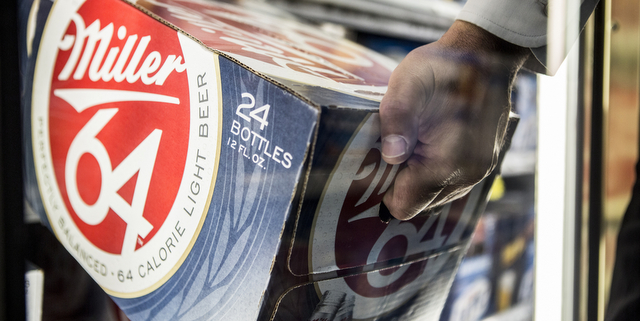
This story has been updated to correct our dummy move of saying MillerCoors (the American joint-venture) in spots when it should have been SABMiller (global mega company). Sometimes we mess up.
As you’ve no doubt heard, while craft breweries continue to acquire or be acquired, the folks at Big Beer had their own business transaction in mind. A-B InBev and SABMiller are close to combining, Voltron-style, to tower over the beer world as a single giant robot. Once these talks surfaced last week, the reaction came in from all over concerning the topics you’d expect: How will this affect the market — locally and globally? What will this do to distribution? How will this affect future craft beer acquisitions and the overall future of the beer world?
Here are a couple headlines:
Big Beer merger could ripple across wider beverage sector
SABMiller, A-B InBev merger could impact MillerCoors ownership, local craft brewers
AB InBev / SABMiller Merger: Molson Coors To Benefit Most Near Term
Impact on Craft Brewers if Global Giants Merge
That last one by Paul Gatza, director of the Brewers Association, included an interesting perspective on the impact on ingredients. Here’s a snippet:
Coors, SABMiller and Anheuser-Busch each conduct barley variety development programs, and own malting capacity to varying degrees, suited to their needs. After an ABI acquisition of SABMiller, the amount of malting capacity owned by the combined largest brewer potentially goes up which could tighten availability of malting capacity and interest in diverse malting lines for every else. This year, craft brewers will consume 33 to 35 percent of all malt used by U.S. brewers, and that proportion will continue to grow in coming years. Craft brewers as a group can help themselves by simply doing the business they need to do. Larger craft brewer requests and contracts to malt different barley lines will be crucial to creating availability for all brewers for malts better suited to all-malt brewing. In this regard, the large malting companies which do business with craft brewers will play a crucial role in binning and malting these varieties.
But the details and impact of the merger are less interesting to me than how much the merger further shows A-B InBev’s extreme focus on global control. It may not be allowed to completely keep American rights to Miller brands — just like it couldn’t keep complete control of Grupo Modelo’s American distribution, of brands like Corona — but it will certainly become a candidate for a world monopoly.
Cue Belgian, multinational beverage execs riding Clydesdales off into the sunset.
The craft brewing industry as a whole has just a completely different spirit. That’s not to say the primary goal of craft breweries isn’t to be profitable and successful or “big,” (as the recent transactions show, some want to be fairly huge) but there is a tipping point of size and scope where the virtues of business and economics (make a quality product that people want or need), get surpassed by its vices (constant need for growth and control).
Consider the 1973 essay collection by British economist, statistician and Rhodes Scholar E. F. Schumacher entitled Small Is Beautiful: Economics as if People Mattered. The book sums up his concept of “Buddhist economics,” and essentially pokes holes (ethical, environmental and otherwise) in the basic principles of economics. For those interested, here is a nice summary. Here is the specific nugget I had in mind:
From the point of view of Buddhist economics … production from local resources for local needs is the most rational way of economic life, while dependence on imports from afar and the consequent need to produce for export to unknown and distant peoples is highly uneconomic and justifiable only in exceptional cases and on a small scale.
A huge majority of the more than 3,500 craft breweries, I think, often sit in the sweet spot that Schumacher was envisioning as a rational approach to the world. Eden, N.C., could serve as a parable of this idea. Big Beer joint-venture MillerCoors says it is shutting down its brewery in Eden. This brewery produced a crap load of beer (7.1 million bbls, including Blue Moon seasonals, Coors Light, Miller Lite and Miller High Life), but was operating less efficiently than a newer brewery in Shenandoah, Va., and sales in decline for more than five years and common economic sense told MillerCoors to shut down the Eden brewery, shift some of that capacity to other breweries and, of course, put more than 500 people out of a job. Low-level employees are really the only ones that pay when the nonstop growth machine stutters. They were streamlined.
But where Big Beer falls short, craft beer has shown it can succeed. We return to Eden where, after the MillerCoors announcement, Greensboro, N.C., restaurateur and developer Marty Kotis said he’s thinking of opening a small craft brewery in Eden.
Kotis said he is not sure when his company would install the brewery in the 15,000-square-foot building he bought earlier this year in Eden’s Leaksville community.
“There’s not a craft brewery in the Southeast that can brew that much beer,” Kotis said. In fact, he explained, all of the craft breweries added together couldn’t make that much beer.
He said even before the closure was announced, he considered Rockingham County to be an ideal spot for a brewery.
Rockingham Community College offers brewery training programs and the workforce is already full of available people with long years of brewing experience.
End of parable. Obviously, this brewery, if it opens, only adds a couple shovelfuls into the giant employment-crater left by MillerCoors, but by being locally owned and focused rather than globally, a craft brewery can uplift and influence a community in a way that mere job volume and profit margins of Big Beer cannot. Craft beer uses an area’s hands; Big Beer just needs its distribution cogs.





Here’s really why craft beer is better than Big Beer (A-B InBev and MillerCoors merger react) http://t.co/q5BN1TTWGi
In talks to merge: @ABInBevNews & @millercoors. What will this mean for #CraftBeer? http://t.co/V5sJ01fEDL
RT @beerwencha2: Here’s really why craft beer is better than Big Beer http://t.co/4p1PiJdnu1
Here’s really why craft beer is better than Big Beer http://t.co/4p1PiJdnu1
Ghostfish Brewing Company liked this on Facebook.
“The craft brewing industry as a whole has just a completely different spirit” http://t.co/qrLi0cbxL0 via @craftbrewingbiz #craftbeer
Here’s really why #CraftBeer is better than Big Beer http://t.co/Em0Zv7itg9 via @craftbrewingbiz
Here’s really why craft beer is better than Big Beer http://t.co/HAaZ4Peshd via @craftbrewingbiz
Jim Sung liked this on Facebook.
Brett Fitzpatrick liked this on Facebook.
Serge Lubomudrov liked this on Facebook.
Danielle Kuglin Seago liked this on Facebook.
HC Kim liked this on Facebook.
This is a really interesting perspective, but what would a Buddhist think of the title? http://t.co/n1MdvzInd6
Here’s really why craft beer is better than Big Beer http://t.co/M0xCCkGLGA via @craftbrewingbiz
#CraftBeer #CraftBrewing #Beer #BeerBiz Here’s really why craft beer is better than Big Beer (A-B InBev and Miller… http://t.co/PhDz3M2D5k